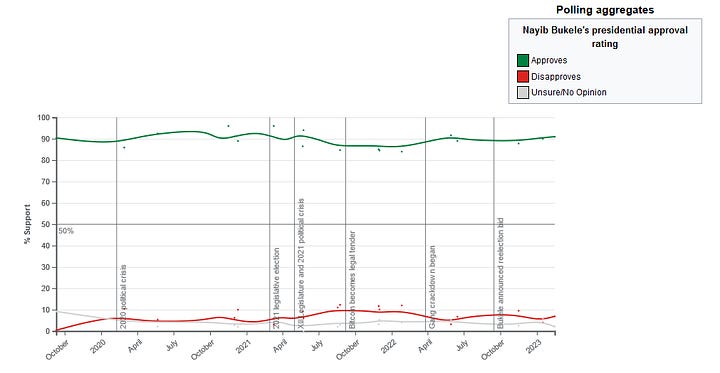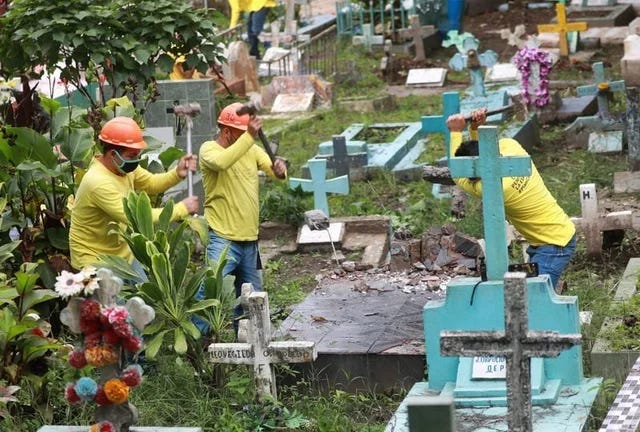Burning Backyards
After rejecting the status quo, the people of El Salvador have renewed hope for tomorrow.
El Salvador has been a basket case for years - a revolving door of juntas, military strongmen, presidents, and transition councils. Stability and instability, success and failure are measured in relative terms. The past few presidents have overseen institutional incompetence, anemic economic growth, corruption, and out of control crime. In a region already wracked with crime, El Salvador’s President Nayib Bukele has taken a different course with the approval of the Legislative Assembly, resulting in a drastic decrease in gang crime since March 2022.
Bukele is not a fully orthodox right-winger or left-winger, but his anti-gang policies have proven to be extremely popular among El Salvador’s citizens. His relatively new party enjoys a strong majority in the legislature, and he is currently poised for re-election in 2024.
Most western liberal political personalities haven’t said much about the anti-gang crackdown, but when they do it’s almost always negative, deriding Bukele as authoritarian and a danger to human rights. The illiberal authoritarian in question is a businessman with a no-nonsense tough-on-crime outlook, who actually means what he says.
The self-proclaimed champions of human rights are almost single-mindedly determined to “protect democracy” on the other side of the world (while enriching more than a few kleptocrats along the way), but their lack of interest in the fires to the south of our own border is quite telling. When they’re not on self-aggrandizing “humanitarian” photo op tours, western liberals are content to throw money at troubled nations in the Americas and then congratulate each other for their generosity with US tax dollars, even if the aid is misappropriated and conditions in the country remain stagnant.
The concern is that non gang-affiliated people have been caught up in Bukele’s crackdown. When you’re talking about any government action (especially action born out of emergency), then you will see misuse and abuse of power. That’s the nature of all earthly governments. It goes without saying that every effort should be made to protect the innocent from false prosecution and imprisonment, and that anyone who is falsely detained or convicted should be thoroughly compensated. That concern is not invalid, but it is quite tiresome to hear from the mouths of people who treat non-interventionism as a four letter word. Call me whatever you like, but I’m simply not interested in lectures about reckless behavior or collateral damage from people who tend to believe that American drone strike campaigns will win hearts and minds. I’m also not interested in complaints about authoritarianism from those who actively suppress speech in their own countries. Perhaps Bukele isn’t the right kind of authoritarian for western liberal sensibilities, since he hasn’t tried to use emergency powers or his popularity to ban dissident political parties or close down disloyal churches.
Apparently, as far as the neoliberalcons are concerned, it was all well and good for El Salvador to endure years of terrifying murder rates and rampant drug trafficking, just as long they maintained a veneer of a Liberal Democracy. Nothing in El Salvador disturbed liberal democracy respecters as much as the rise of an “authoritarian” like Bukele. Mind you, Bukele’s party Nuevas Ideas is far and away the most popular among the people, having broken the backs of the two long-dominant parties, ARENA and the FMLN. Maybe Bukele isn’t a Liberal Democrat at heart. And maybe conventional liberal democrats in El Salvador could have reversed the trend of drug cartel violence with carrot-over-stick tactics, but Bukele’s predecessors failed to make that happen.


Notably, President Mauricio Funes held the office from 2009 to 2014. Critically, gang crime was not only left unchecked, but was effectively legitimized through a preposterous truce. To nobody’s surprise, the truce failed and upon its collapse, gang crime returned to “normal” levels. As for Funes, he was indicted for illegal enrichment and Nicaragua has given him asylum.
The US State Department and their NGO busybody puppets normally never pass up a chance to meddle in the affairs of other countries, but they were not terribly outraged when El Salvador was burning under previous administrations and the rights of regular citizens were being trampled upon by cartels. In fact, the idea of US military action against drug cartels (more so in Mexico than El Salvador) seems to be the lone intervention proposal where American warhawks are suddenly disinterested. In fact, their disposition towards the idea is more hostile than cautious. I don’t think anyone is seriously proposing artillery strikes on Mexico City or San Salvador like the kind we saw in Afghanistan. The more likely approach would be for American special forces to carry out surgical small arms operations against cartel bases, supply hubs, and training camps in coordination with trusted local forces. This has been successfully done before with minimal collateral damage, but the cartels remain powerful to this day.


Uber-hawks like David Frum are apparently content to see Salvadorans, Mexicans, and Americans suffer as long as the countries maintain a veneer of liberalism. After decades of violence, why is anyone surprised that Salvadorans voted for and continue to support an anti-cartel hardliner? Could it be that Western observers are angry because Bukele has jabbed them for their decadence and failure to stop crime in their own cities? Could it be that “protecting American interests” has nothing to do with protecting American citizens?
The bleeding heart-ism is part of the outrage, but I believe the outrage is also built on something even more nefarious. The dysfunction and crime in the region have historically made the country very vulnerable. The stagnant economy and endemic violence have convinced many people to pull up stakes and head north for greener pastures. Neoliberalcons rarely talk about the cartels directly, except perhaps to chide border security advocates as xenophobic fearmongers. You’ll recall that Donald Trump was excoriated by Enlightened and Compassionate Liberals™ for referring to MS-13 as “animals”, though it should be noted that Trump was more bark than bite when it came to the border. While far too many Americans have been murdered or otherwise afflicted by cartels, and while every life lost is a tragedy regardless of race or national extraction, the race hustlers should be reminded that the most frequent victims of the cartels are Hispanic people outside the US. Politicians are intimidated, bribed, or killed, communities are destroyed, and the planet keeps spinning without much acknowledgement from immigration activists. In any case, neoliberalcons still aren’t very adept at avoiding the issue anyway, as they can’t help but make accidental references to the violence, instability, and poverty through their favorite platitudes.
They’re refugees. They’re seeking asylum and a better life.
Refugees of what? They’re not terribly interested in exploring that question, but they are clearly content to watch people leave in droves and arrive in America as cheap, exploitable labor. Even when the cartel violence follows them into the US, the big-hearted neoliberalcons shrug their shoulders and don’t care to look for solutions. Country club conservatives and gated community liberals alike are content with the status quo, because the endless mass importation of refugees is good for their corporate backers. It’s not so good for Americans, who are expected to compete in the labor force against an ever-growing populace of chronically low wage workers, and it’s not so good for Salvadorans or Mexicans who are still stuck living under the cartels and bought-off police chiefs back at home, to say nothing of the brain drain that deprives these nations of potential workers and anti-cartel political revolutionaries.
El Salvador isn’t fully out of the mire just yet, and stopping the cartels is only one piece of the puzzle. The economy remains weak, and government corruption is still significant. Time will tell if Bukele’s crackdown leads to long term success, or if the country’s drop in murders will be reversed by “compassionate” busybodies. But the decline in gang power in El Salvador is good for its people and good for the region. It is certainly not necessary or permissible for the US government to suspend the Constitution or abolish fundamental legal rights in order to halt organized crime within its own borders. While the American crime wave is serious in its own right, it would be an overstatement to say that our problem is as severe as El Salvador’s history of extreme gang violence. The good news is that we already know what’s needed to stamp out cartel-related crime in America - show soft-on-crime district attorneys the door, secure the border, and designate international cartels as the terrorists organizations that they are. American conservatives should be taking notes on Bukele’s tough-on-crime stance.




